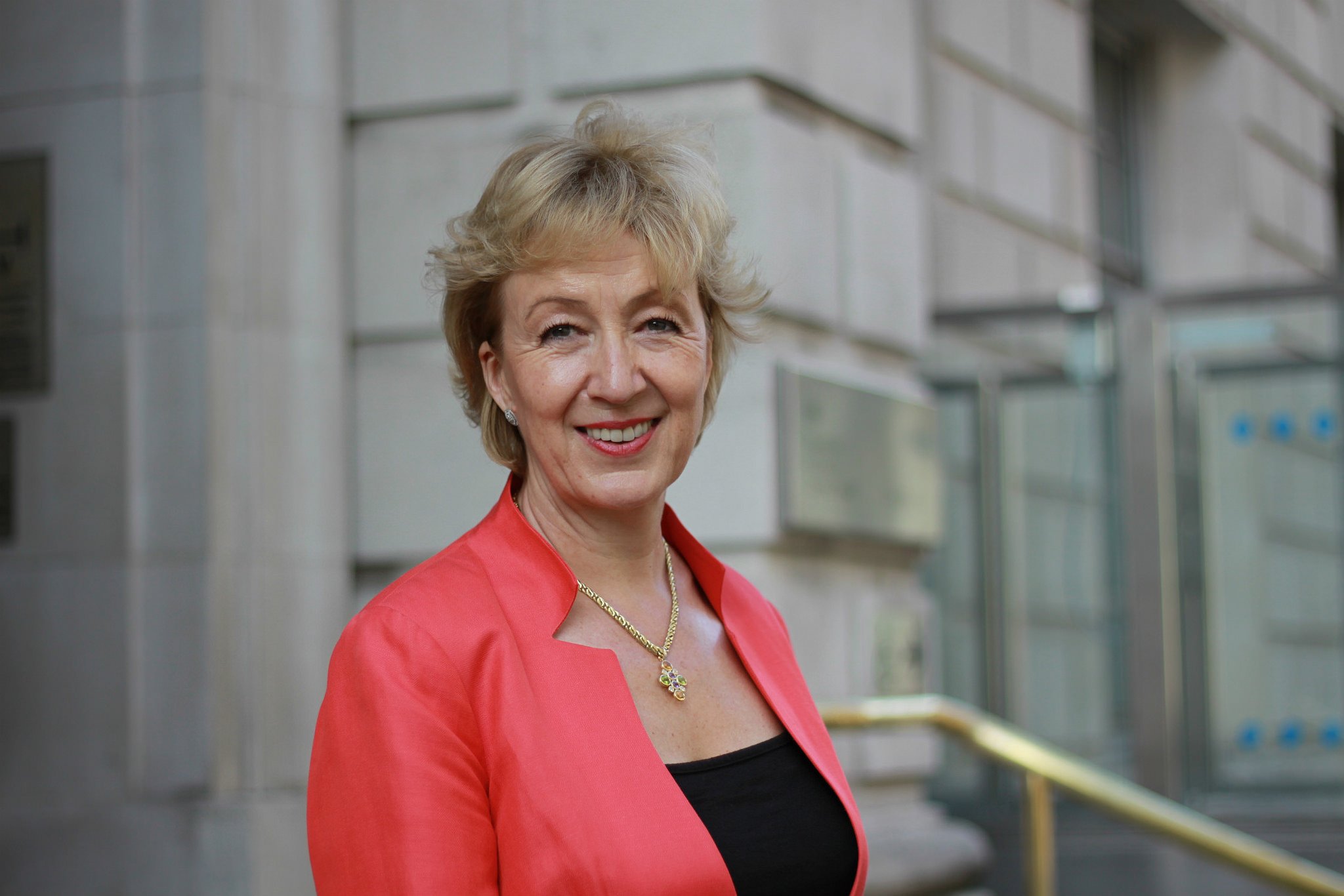Andrea Leadsom has said that parents should be given the option of withdrawing their children from classes that teach LGBTQ+ rights at school.
During an interview with LBC host Nick Ferrari on Wednesday, the Leader of the House of Commons said that while she agrees with the Government passing new legislation to ensure better relationship education in primary schools, she believes families should be at liberty to decide “the moment to which their children become exposed to that information”.
Her comments come as four more schools in Birmingham have opted to suspend an Ofsted-approved No Outsiders class, which aims to teach children about the Equality Act, because of an outcry from parents about a section on the rights of LGBTQ+ citizens.
What Did Andrea Leadsom Say In Context?
The Leader of the House was asked by host Ferrari about the “looming row on LGBT classes in primary schools being started and then stopped because of protests from parents”.
He continued: “I know that you have a faith and you follow your faith. Do you have respect for people who are maybe Orthodox Jewish, devout Muslims and have real issues about LGBT classes. In which case, what’s the future? How do we get a happy medium?”
Leadsom responded: “Well I think… this party, my party has done a huge amount to support LGBT rights and quite rightly too and I’m a massive supporter of the efforts that we’ve made to achieve real equality in LGBT rights. And so it’s absolutely vital that children do grow up understanding the society that they live in, and that they grow up tolerant and seeking equality and respecting differences.
“So I think that it is right that the Government should have passed legislation that requires that relationships and sex education is taught in schools, but at the same time I also agree that it is right that parents should be able to choose the moment to which their children become exposed to that information and there are steps taken to enable parents to withdraw their children from classes up until a certain age.”
Question on LGBTQ+ education appears from 28minutes
Ferrari then asked Leadsom what age that would be.
She replied: “Well I’m sorry, I’m actually not quite sure.”
“I think it’s running up to their sixteenth birthday but don’t quote me on that, I’d have to check,” she said.
It is really important that we absolutely accept equality in every area whilst at the same time respecting that parents may have concerns about how young their children are when they become aware of these things.
Andrea Leadsom speaking to LBC Radio
Asked if a five-year-old would be able to learn about LGBT issues, Leadsom said she didn’t believe that to be the case.
She added: “At the same time for many parents, myself included, I would be entirely happy for my children to grow up finding that their LGBT classmates are exactly the same as them. One of my own kids was in a class with a friend who had two mums and that was absolutely normal right from a very young age.
“And I think it is really important that we absolutely accept equality in every area whilst at the same time respecting that parents may have concerns about how young their children are when they become aware of these things.”
She concluded by agreeing that achieving a “happy medium” was a “fine balance”, adding: “I think it is the case that you have to allow parents to chose to withdraw their children up to a certain age, but at the same time, in order to have an equal society, there comes a point where children do need to understand the societal norms around them.”
What Is The Equality Act And How Does It Affect Leadsom’s Proposal?
The Equality Act 2010 came into effect to provide a stronger and more streamlined legal framework for effectively tackling disadvantage and discrimination.
The Act covers nine protected characteristics, including sexual orientation, race, religion, gender reassignment, pregnancy and maternity, age, disability, and marriage or civil partnership.

Image credit: Schools OUT demonstrators/Flickr
It means that people are not allowed to discriminate, harass or victimise another person with one of these protected characteristics. There should be protection for those facing discrimination – or for those under attack for their association with someone who has a protected characteristic.
The Government, and any public authority receiving money from the Government to provide a service, have a responsibility to ensure that the Equality Act is adhered to. They have an obligation to protect, promote and enforce equality.
Does This Mean That Schools Have A Duty To Teach LGBTQ+ Rights?
Under the Equality Act, public services, like schools, have a duty to promote and ensure equality, which includes promoting the equality of LGBTQ+ individuals as protected citizens.
Sue Sanders, the chair of LGBT educational charity Schools OUT UK and Professor Emeritus at the Harvey Milk Institution, tells Rights Info: “If [Andrea Leadsom] says this then she is going against the Equality Act and the public duty which requires anyone who receives public money must educate everyone about all the protected strands.”
The Government pledged to make relationships education compulsory in all of England’s primary schools, while age-appropriate relationships and sex education (RSE) was made compulsory in all of England’s secondary schools in 2017.

Image credit: Rainbow paints at school/Pixabay
After two rounds of public consultation, the Government published its final draft on guidance for teaching the subjects, which included making sure that all primary schools are taught about LGBT inclusion and different family set-ups, while secondary schools will be taught about gender identity and sexual orientation.
The draft Relationships Education, Relationships and Sex Education and Health Education (England) Regulations 2019 is set to be voted on in Parliament on Wednesday 20 March.







